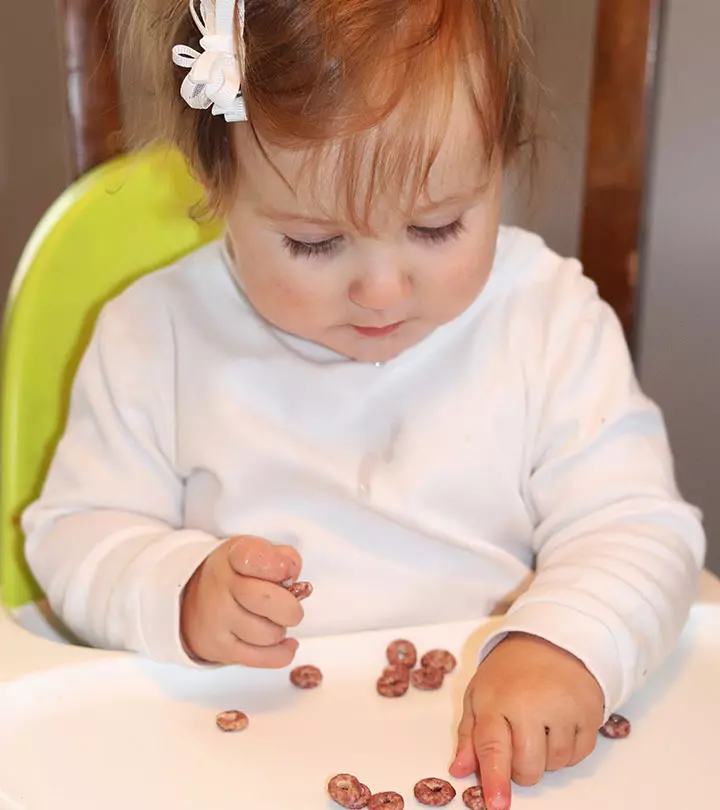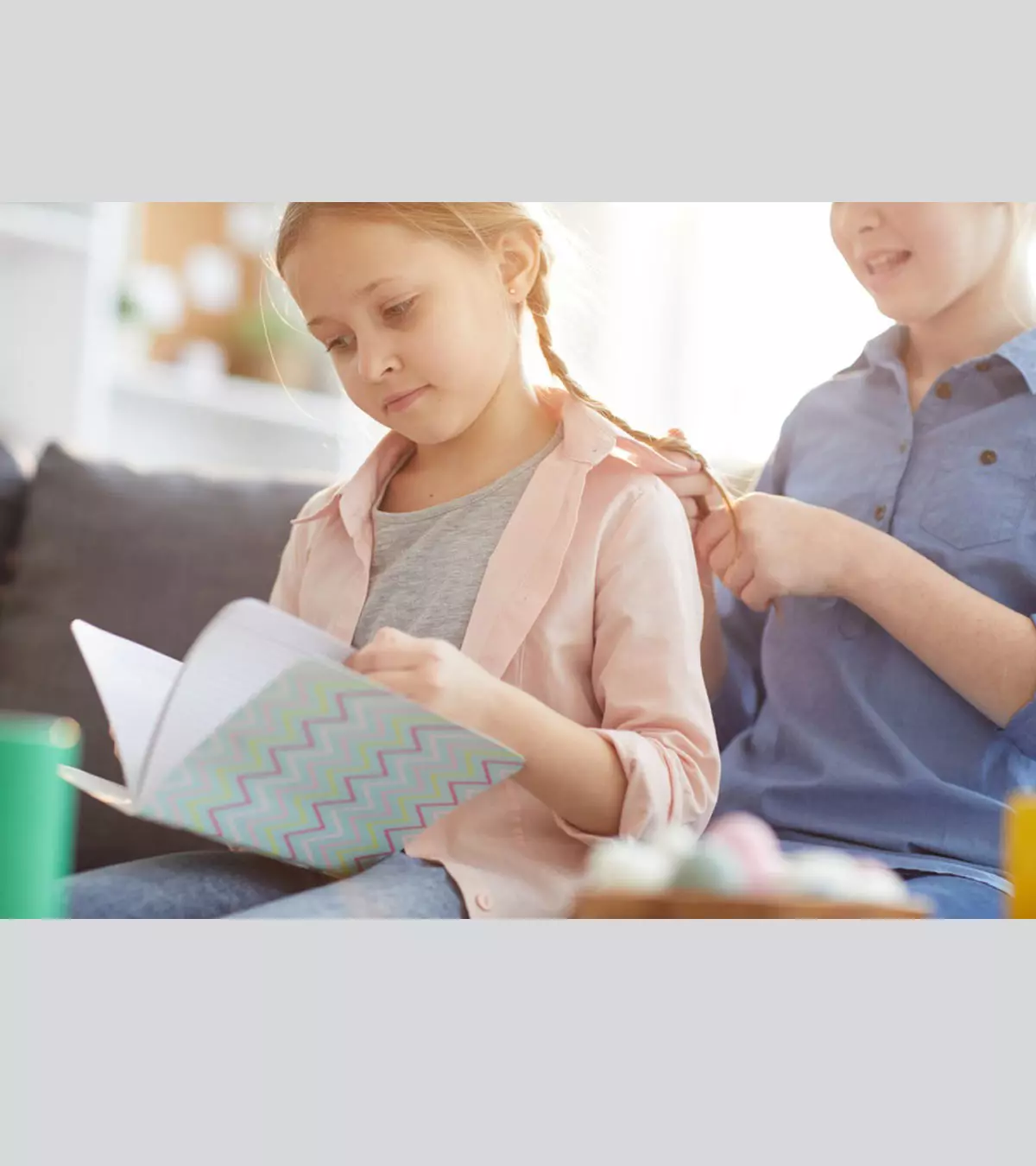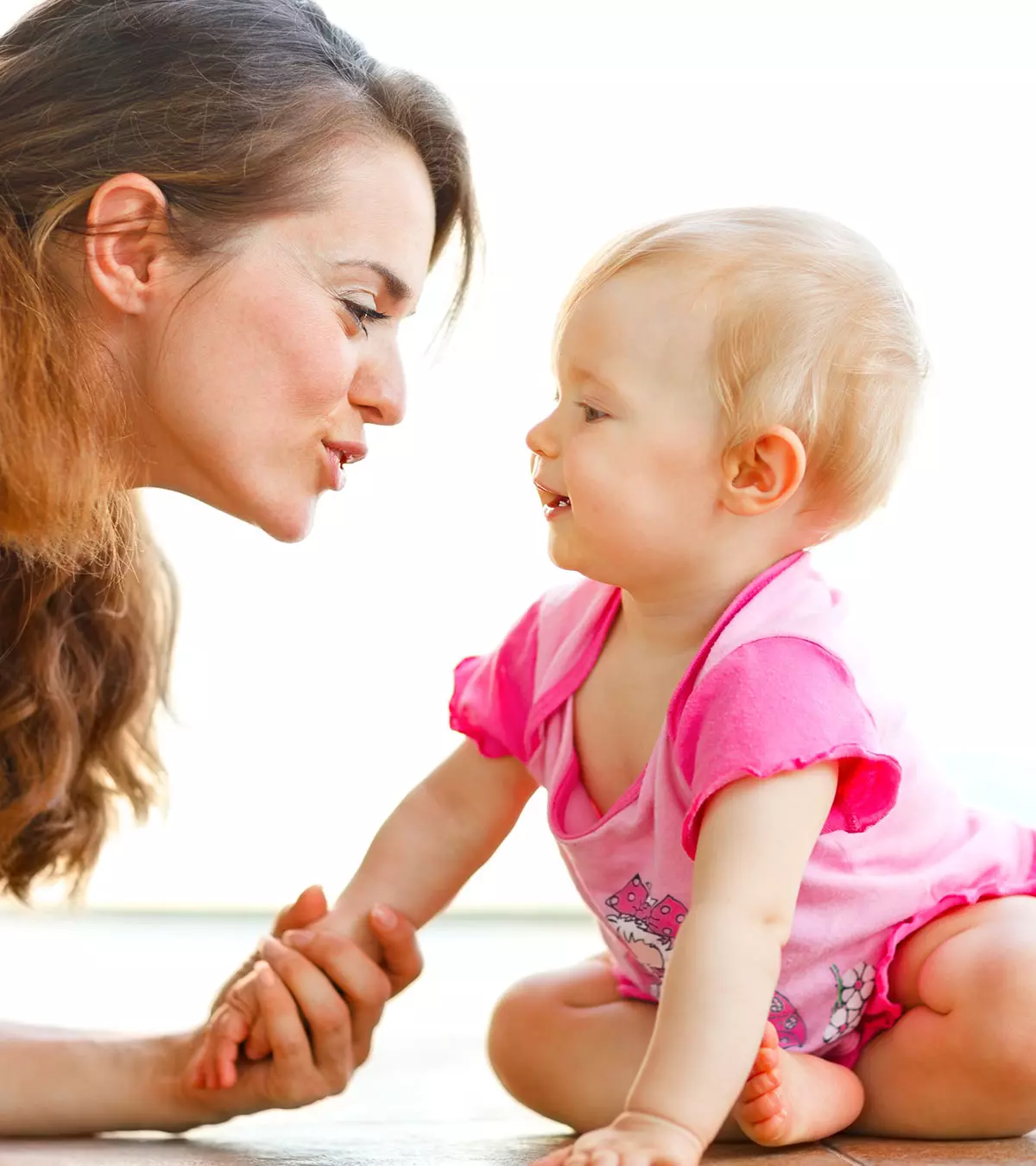
Image: Shutterstock
Fostering social-emotional development for infants and toddlers is just as important as teaching them how to walk, talk, and eat. Social-emotional development refers to the child’s ability to experience, express, and manage their emotions and form positive and rewarding relationships with others (1).

Read this post as we delve deeper and explain what social-emotional development is, including the various developmental milestones, and give you tips on developing social and emotional skills in infants and toddlers.
Key Pointers
- Social-emotional development refers to a child’s ability to feel, express, and manage emotions and build positive relationships with others.
- Babies and toddlers benefit from social-emotional development as it helps them acquire life skills for adulthood.
- Warm, receptive, and consistent care is essential for enhancing infants’ social-emotional development.
- Attending to vocalizations, taking the baby outside, and modeling emotional behavior can aid in their emotional and social development.
What Is Social-Emotional Development In Infants?

Social and emotional learning is a process through which babies begin to learn and develop life and coping skills to understand and manage emotions, set and achieve positive goals, feel and show empathy for others, establish and maintain positive relationships, and make responsible decisions that will continue in their adult life (2).
Babies are born with the need and desire to connect with people around them. Primary caregivers and teachers play a crucial role in supporting the development of emotional and social skills and fostering bonding in babies (3).
Social And Emotional Developmental Milestones
Babies begin their emotional and social development at birth and achieve different milestones at different ages
. The following are the usual developmental milestones seen in babies (4).
- At birth, babies can turn to a familiar voice and follow a face or object with their gaze from a short distance. They have a range of ways of using their behavior for communication, such as by turning away when they feel overwhelmed by sensory inputiThe response a sense organ receives upon external stimulus .
- In the first few months, they respond to emotions in a caregiver’s voice and react to their environment. By around 8 weeks babies begin to have a “social smileiThe smile a baby gives back in response to the caregivers smiling at them .”
- By around nine months they begin to show what is termed “stranger anxietyiThe distress a baby experiences when an unfamiliar person approaches ” although there is great variation in the intensity and timing of these developmental steps.
 Did you know?
Did you know?Some babies reach developmental milestones sooner than others. If you suspect any delays in your baby, then do not hesitate to contact the doctor.
9 Essential Tips For Nurturing Social-Emotional Development In Infants
Infants learn social and emotional skills naturally.
They need not be taught, but you can support the baby in reaching the milestones (3) (5).
- Talk, read, and sing together: The primary mode of learning and exploration for infants is by interacting with the people around them. So, read, talk, and engage them in play activities for babies aged 1 to 12 months. In addition, these simple interactions help the baby feel connected and develop trust with their caregiver, promoting their learning and development.
 Quick tip
Quick tip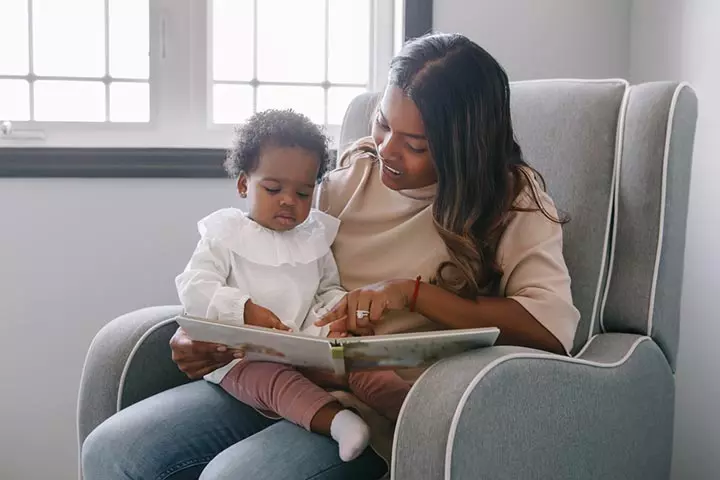
- Provide warm, responsive, and consistent care: Smile while interacting with your infant. Frequent cuddles and hugs are a way of expressing your love and affection to the baby, and they learn to do the same when they grow up.
Try and understand the cues your non-verbal baby gives you by his/her actions. Babies feel loved and acquire a sense of security when you respond to their basic needs like hunger, a wet diaper, need to be held in arms, etc. But do not expect immediate responsiveness or being in perfect harmony with your baby. We know from infant research that in typical, healthy relationships caregivers are out of sync with their infants in about 70% of interactions. Babies thrive and relationships grow when they have the opportunity to work through these moment-to-moment misunderstandings and repair missed connections. It takes time and more than a single interaction for parents and infants to figure each other out. Don’t aim to be perfect or be hard on yourself; you will get there with patience and resilience.
- As best you can, maintain some consistent, predictable routines: Try and provide them a consistent routine of feeding, napping, playtime, etc. They are more relaxed when they are aware of what to expect next.
- Know your baby and follow their lead: Try and understand your baby’s likes and dislikes. For example, some babies are cuddly and love to be swaddled, while others prefer more autonomy and like to observe the world on their own with their arms and legs free to move.
- Play simple social games: Games such as peek-a-boo and cooing back and forth help develop a bond and encourage self-regulation. These games, and the “games” of feeding, diaper changing, and going to sleep are all examples of ways your baby acquires cultural awareness besides satisfying their innate curiosity.

- Respond to vocalizations: Respond when the baby is blabbering or making cooing sounds. Nod your head and reply to them like you understand what they are trying to say. They learn turn taking during conversations well before they have words.
- Take them outdoors: Ask your pediatrician about when you can start taking the baby outdoors. Taking them out for a stroll and introducing them to neighbors, friends, etc. can be one of the best things to do with a newborn baby. Show them the sky, flowers, and animals. This way, they will begin to recognize people and things around them.
- Be an emotional role model: Babies are very adept at reading our emotions. Lead by example. As best you can, respond calmly to good or bad situations, show kindness and compassion towards others, and be emotionally available to the baby when they need you. This encourages the baby to have healthy family and peer relationships when they grow up. Of course at times all parents are tired, and may lose their cool. If you feel overwhelmed try to get relief from another caregiver, such as your partner or look for cooperation from a family member. As described above, as long as parents repair such moments of disruption, family relationships will grow in a healthy way.
- Recognize and talk about emotions: Even before they have words, if you narrate their emotional experience it helps them to connect their feelings with words.
 Point to consider
Point to consider
Reflect their emotions without feeling that you need to imitate them exactly. When you show with your emotional expression and voice that you understand their feelings but that their feelings are not exactly the same as yours, you help your child to take ownership of their temperament and emotional experience. Encourage your child to find ways to self-soothe. It also encourages adaptability and helps them learn to be content. Thumb sucking is one way babies self-soothe. Some parents may prefer to have them use a pacifier. However, the thumb is always available and when parents do not call attention to the behavior, children typically stop on their own when the behavior is no longer age-appropriate.
Learn to give space to the baby when he/she is not in a mood to play and is overwhelmed or irritated. Talk softly, cuddle them, and sway with them back and forth to help them relax.
- Manage stranger anxiety: Stranger anxiety in babies tends to occur at around 9 months of age as they develop the thinking skills necessary to hold an image in their mind of caregivers even when they are out of sight. Give them confidence that even if you are not seen around, you are always there for them. Play games like peek-a-boo or hiding behind the door and peeping. Stand up in front of them, and say to them, “mommy is going” and walk out of the room. Come back in a few seconds and say, “mommy is back.”
Frequently Asked Questions
1. What are the potential risks of not addressing social-emotional development in infants and toddlers?
Not addressing an infant’s social-emotional development might lead to difficulties with attachment and poor socialization skills. In the long run, this might increase the risk of lower academic achievement and mental health issues.
2. How does a child’s environment affect their social-emotional development?
Positive and nurturing environments with supportive caregivers and positive social interactions can promote healthy development, while negative environments can lead to emotional and behavioral problems.
3. What are the benefits of early intervention for social-emotional development in infants and toddlers?
Early interventions can provide benefits such as improved social and emotional skills, reduced risk of mental health problems, and improved family relationships.
Social-emotional development for infants and toddlers deals with developing skills in managing and expressing their emotions. This, along with cognitive activities for infants, goes a long way in affecting their decisions and relations with other people in the future. Smiling at parents or expressing anxiety about seeing strangers are signs of social-development milestones. Understanding your baby’s cues, playing with them, responding to their actions, and familiarizing them with other people help them develop this skill. Ensure you nurture your social and emotional wellness and lead by example. Identify what works the best for your little one, as every baby is different.
Infographic: Helping A Baby’s Social-Emotional Development Through Talking
Having conversations with your baby or talking to them helps their language, vocabulary, and emotional development. Although your little one is not responding to your conversations, do not feel as if it is going in vain. Give this infographic a read to understand how talking to your baby will help their development. Illustration: Momjunction Design Team
Illustration: Useful Tips To Enhance Social-Emotional Development In Babies
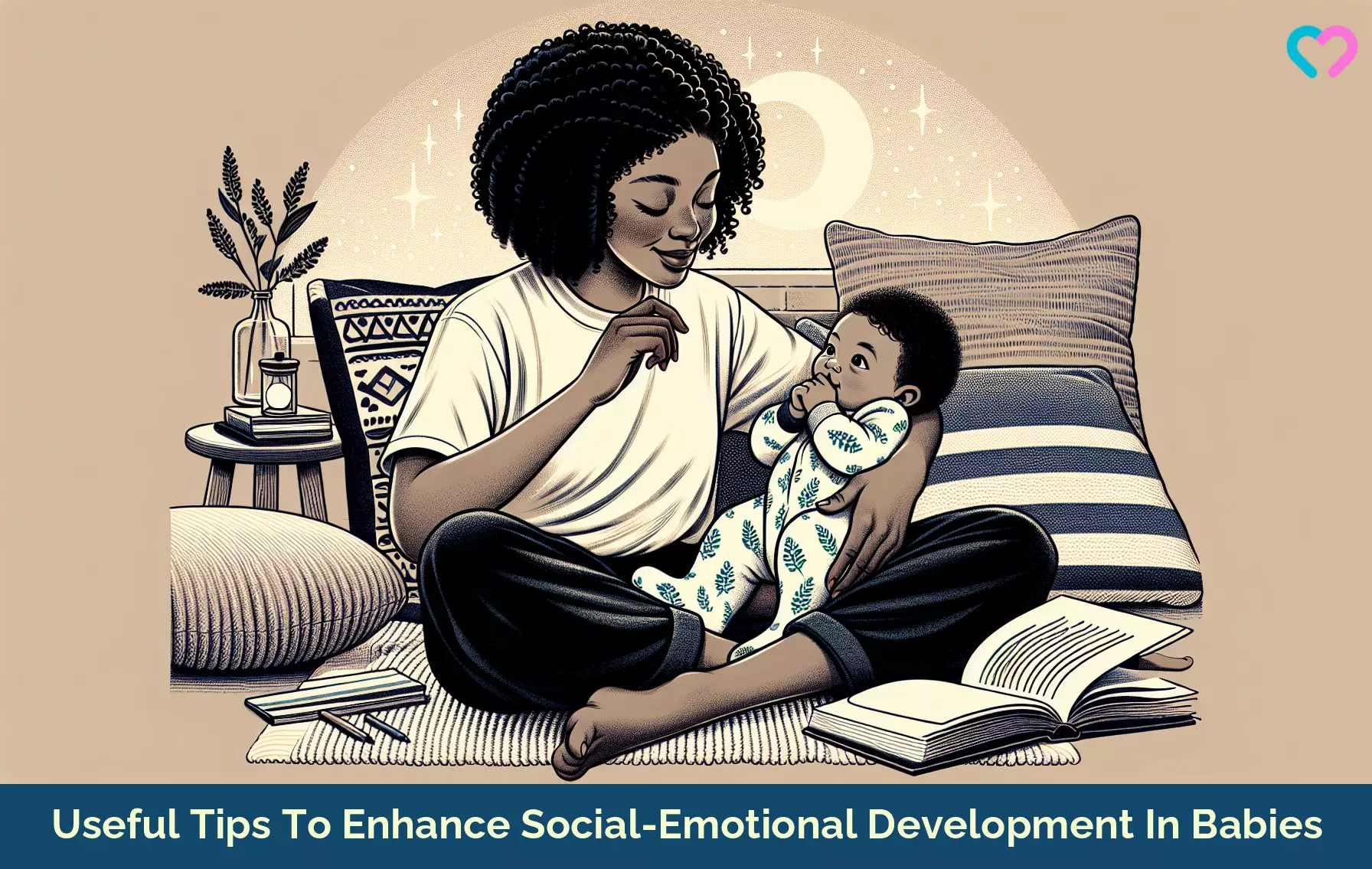
Image: Dall·E/MomJunction Design Team
Learn about the social and emotional milestones for infants and toddlers. Discover how to help your child develop and grow in a healthy way. Watch this video to know what you can expect with your little one.
References
- Social-Emotional Development Domain; California Department of Education
https://www.cde.ca.gov/wafalert.html?_event_transid=9ec9646ffa290ffffe1bfc274701cae6e9b4d948ce72f6179028172b84e9590b - What is SEL?; Collaborative for Academic Social and Emotional Learning (CASEL)
https://casel.org/fundamentals-of-sel/what-is-sel/ - Fostering Healthy Social and Emotional Development in Young Children.
https://portlandstartingstrong.org/wp-content/uploads/2016/12/feelings-families.pdf - Chapter 4: Infancy and Toddlerhood; Maricopa Community Colleges
https://open.maricopa.edu/devpsych/chapter/chapter-4-infancy-and-toddlerhood/ - Birth to 12 Months: Social-Emotional Development; ZERO TO THREE
https://www.zerotothree.org/resource/birth-to-12-months-social-emotional-development - Emotional & Social Development in Babies: Birth to 3 Months.
https://www.healthychildren.org/English/ages-stages/baby/Pages/Emotional-and-Social-Development-Birth-to-3-Months.aspx - Social & Emotional Development for Infants (Birth – 12 Months).
https://www.michigan.gov/mikidsmatter/parents/infant/social
Community Experiences
Join the conversation and become a part of our nurturing community! Share your stories, experiences, and insights to connect with fellow parents.
Read full bio of Claudia M. Gold
Read full bio of Dr. Ritika Shah
Read full bio of Rohit Garoo
Read full bio of Apoorva K






